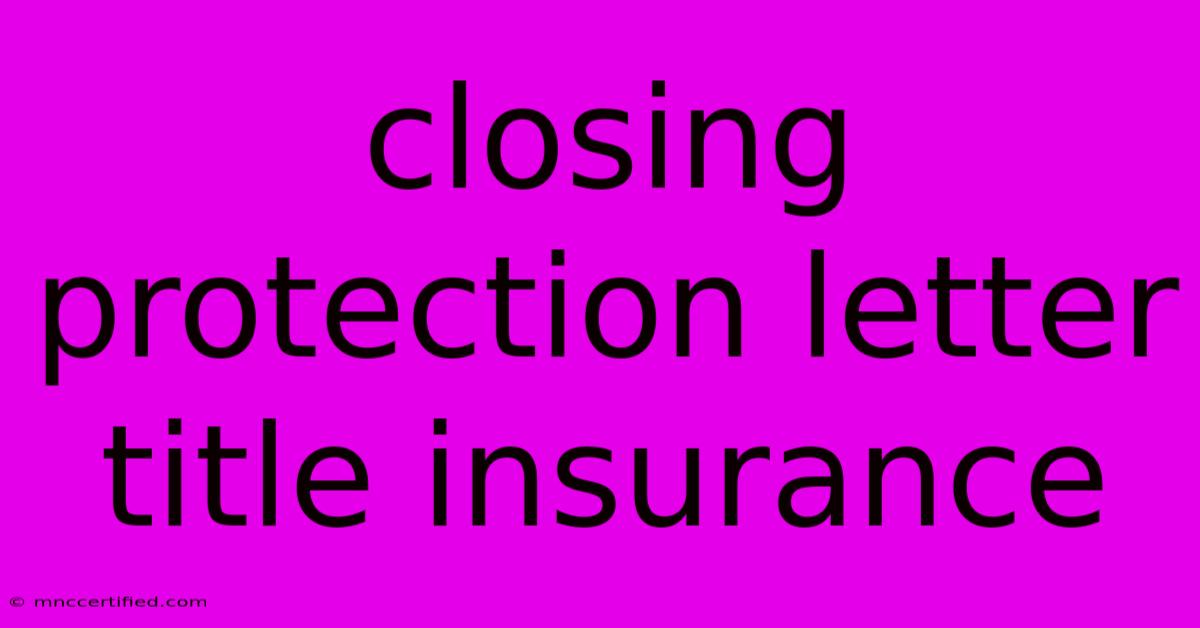Closing Protection Letter Title Insurance

Table of Contents
Closing Protection Letter: Your Shield Against Title Defects
Buying a home is a major investment, and securing clear title is crucial to protect your financial interests. A closing protection letter (CPL), often included with title insurance, acts as an extra layer of security against unforeseen title issues that may arise after closing. This article will explore what a CPL is, how it works, and why it's important to consider adding it to your closing process.
What is a Closing Protection Letter?
A closing protection letter (CPL) is an insurance policy that offers financial protection to homebuyers and lenders against certain types of title defects that could arise after the closing date. These defects can include:
- Forgeries and Fraud: Unforeseen claims of ownership or liens on the property.
- Errors in Public Records: Mistakes in property records that might create ownership confusion.
- Unrecorded Encumbrances: Liens or easements that were not properly documented before closing.
How Does a Closing Protection Letter Work?
A CPL acts as a safety net, offering financial compensation if a covered title defect surfaces after you've moved into your new home. This coverage typically lasts for a specific period, often for one to two years.
Here's how it works:
- Title Defect Discovery: You or your lender discover a covered title defect after closing.
- Filing a Claim: You notify the title insurance company about the issue and file a claim.
- Investigation and Resolution: The title insurance company investigates the claim and works to resolve the issue.
- Compensation: If the claim is valid, the title insurance company will provide financial compensation to cover the costs associated with the title defect.
Benefits of a Closing Protection Letter
- Peace of Mind: A CPL provides peace of mind knowing that you're protected from unexpected title issues.
- Financial Security: It protects you from significant financial losses that could arise from title defects.
- Reduced Risk for Lenders: CPLs also benefit lenders by reducing their risk of defaulting on mortgages.
- Simplified Process: If a title defect arises, the title insurance company handles the legal and financial aspects of the resolution.
Is a Closing Protection Letter Right for You?
While not always mandatory, a CPL can be a valuable addition to your home purchase. Consider these factors:
- Your Risk Tolerance: Are you comfortable taking on the risk of potential title defects?
- Property Complexity: Is the property in a complex area with a history of title issues?
- Cost: While CPLs offer peace of mind, they do come with an additional cost.
- Lender Requirements: Some lenders may require a CPL as part of their loan terms.
Conclusion
A closing protection letter is an important investment that can protect you from unforeseen title issues after closing. It provides financial security and peace of mind, making it a valuable tool for homeowners and lenders alike. By carefully evaluating your individual circumstances, you can determine if a CPL is right for you.
Keywords: closing protection letter, CPL, title insurance, title defects, property purchase, home buying, real estate, closing costs, lender requirements, financial protection, peace of mind, risk tolerance, property complexity, title insurance company, claims, compensation, investigation, resolution.

Thank you for visiting our website wich cover about Closing Protection Letter Title Insurance. We hope the information provided has been useful to you. Feel free to contact us if you have any questions or need further assistance. See you next time and dont miss to bookmark.
Featured Posts
-
Californias Crime Surge Downtowns Laws And Change
Nov 07, 2024
-
Levis Heir Tops Sf Mayoral Polls
Nov 07, 2024
-
Lorry Overturn On M6 Leads To Fatality
Nov 07, 2024
-
How Long Does Bonding Last On Front Teeth
Nov 07, 2024
-
Commercial Condominium Insurance Coverage
Nov 07, 2024